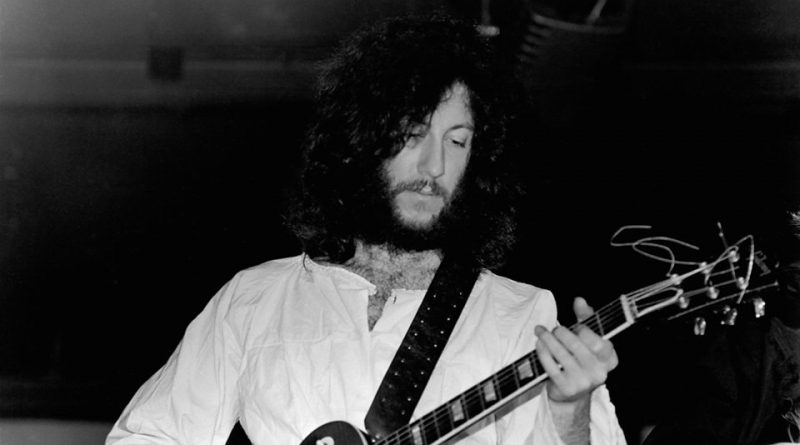Peter Green: Fleetwood Mac’s forgotten founder
Peter Green was born to a Jewish family in Bethnal Green, where he learned to play the guitar in synagogues and his bedroom in Cambridge Heath. Green would go on to found Fleetwood Mac, one of the biggest Rock’n’Roll bands of all time.
The Minerva Estate
If you turn off Cambridge Heath Road you will see the stark white concrete of the first post-war estate erected to home the houseless of the East End. Weaving your way through the cool white concrete buildings of Minerva estate is a pleasant experience, lush gardens fill the spaces between buildings and there is an identifiable air of calm.
One of Minerva estate’s modest apartments was home to the Greenbaums, a family of six, whose youngest son played first guitar in the synagogues of Bethnal Green before founding one of the definitive Rock n Roll bands of the 20th century.
The Greenbaums were housed there the year their son Peter was born to a Jewish family of six in 1946. Before WWII years of fascism and anti-Semitism saw Jewish homes in the East End attacked with bricks. After the war, Peter’s father, formerly Joe Greenbaum, officially changed the family name to Green.
The Green family were the first to live in their flat in the Minerva estate, which was fitted out with a rooftop childhood play area supplied with toys from the council. At the time one new resident Mrs Janet Waterton said of her new home: ‘Having a bathroom is marvellous!’
Known by the world as Peter Green, he would leave Tower Hamlets behind and form ‘Peter Green’s Fleetwood Mac featuring Jeremy Spencer’, which would later become Fleetwood Mac.
The unlikely rockstar
Green has a backseat in Bethnal Green’s history. This is likely due to his early exit from the band, and the nature of his character. He’s surprisingly quiet for a man inaugurated in the Rock and Roll Hall of Fame who founded a band that would outsell the Beatles. In an interview with 360 Lounge in 2000 he said: ‘My writing is predictable… there’s a basic simplicity to it.’
However, his self-effacing nature melted away on stage. In 1969, the last year he performed with Fleetwood Mac, he played “Oh Well’ at the Music Mash in LA. As his fellow musicians bend over their guitars with a vigour that’s difficult to identify as farcical or genuine, he is remarkably relaxed given the skill he’s demonstrating.
Green mutters his lyrics into the mike and sweeps his John Lenon-esque fringe to the side his stare has the quality of someone looking over your shoulder at a party, searching for something more interesting. As the camera pans away the front row of teenage girls look at him almost studiously.
Peter Green’s rise to fame
Green first started playing guitar playing in the synagogues of the East End, forming his first band, Bobby Dennis and the Dominoes, which performed pop and rock’n’roll covers.
Green’s first real gig was for the rhythm and blues band the Muskrats, in the mid-60s, followed by a brief stint with the Tridents where he played bass.
By 1965 Green was playing in Peter B’s Looners, which was where he met drummer Mick Fleetwood. Green, a handful of members and Rod Stewart then went on to form the Shotgun Express, a Motown-style band which Green soon left.
Then, crucially, Green filled in for Rock God Eric Clapton in John Mayall & the Bluesbreakers. Mike Vernon, a producer on the label recalled being told the band had found “someone better” than Clapton, and was then introduced to Green.
In 1967 Peter Green’s Fleetwood Mac featuring Jeremy Spencer was formed, with Mick Fleetwood on the drums, and their eponymous debut album remained in the British charts for 37 weeks.
Then the band shot to fame in 1968 with Peter Green’s Fleetwood Mac’s first album “Albatross”, which outsold both the Rolling Stones and the Beatles albums that summer.
Life after Fleetwood Mac
However, by 1969 his chosen drug, LSD had begun to take hold of him as he took increasingly more frequent doses of the drug. He then began to preach to his band about giving all of their money away. He proceeded to give almost everything he had to various charities.
While touring Europe in late March 1970, Green took LSD at a party at a commune near Munich. It was at this point his mental decline started to unravel, resulting in him leaving the band in 1970. Fellow bandmate, John McVie said of the period: “The fact is Peter was already set to leave Fleetwood Mac”
In 2000 between a recognisable Cockney accent that withstood the test of time and years spent in America, the only clear phrase is: ‘I feel like smashing them over the head with my guitar’, but said with the warmth and humour of a true East Ender.
Like many an ‘East Ender’ he later moved to Essex. He took up residence in Canvey Island where he eventually spent most of his time from the early noughties, much of which he whiled away by fishing, his second biggest passion.
Green nicknamed the Green God by fans, received a flurry of tributes when he died at 73 in 2020, in Essex.

